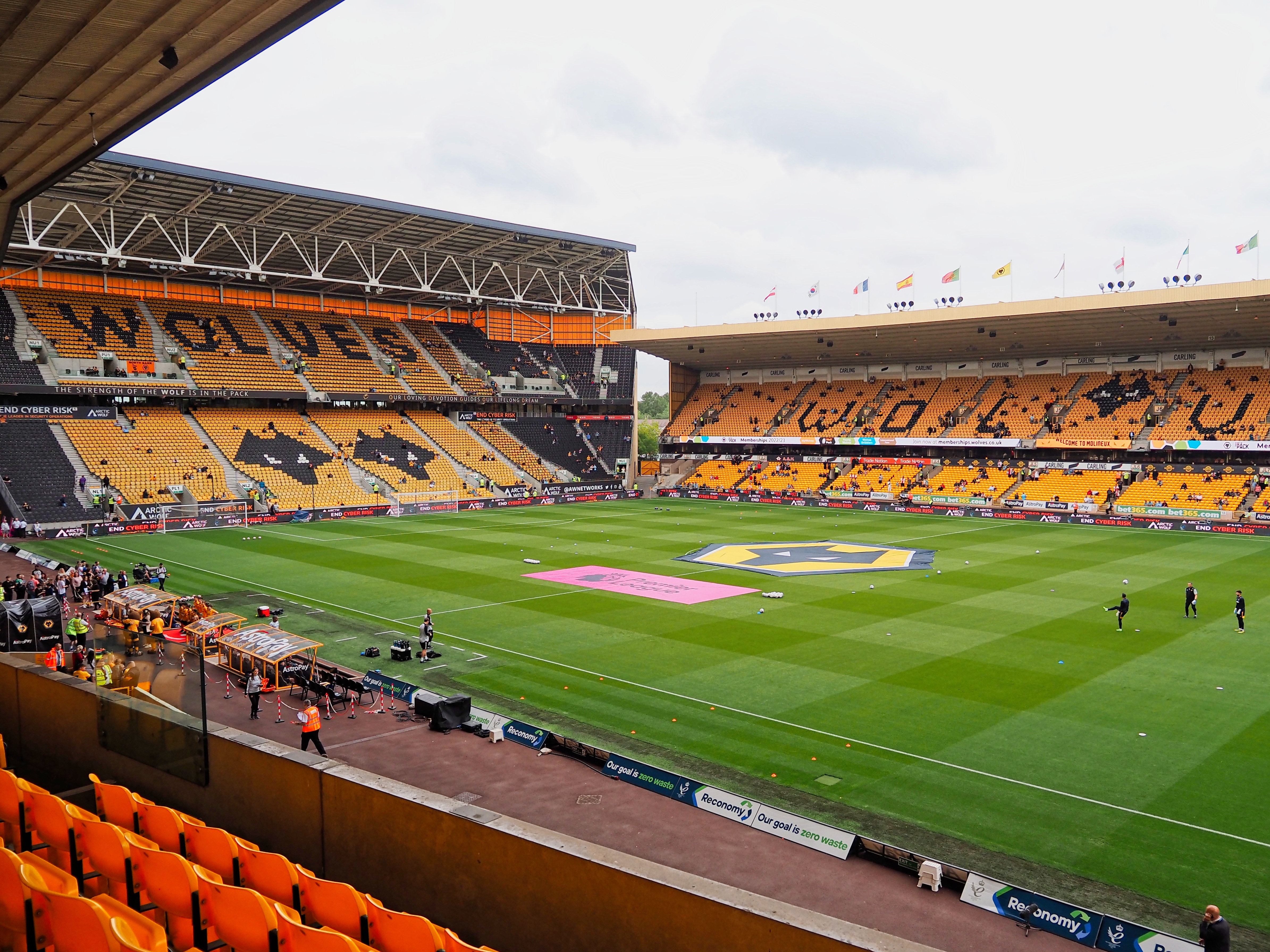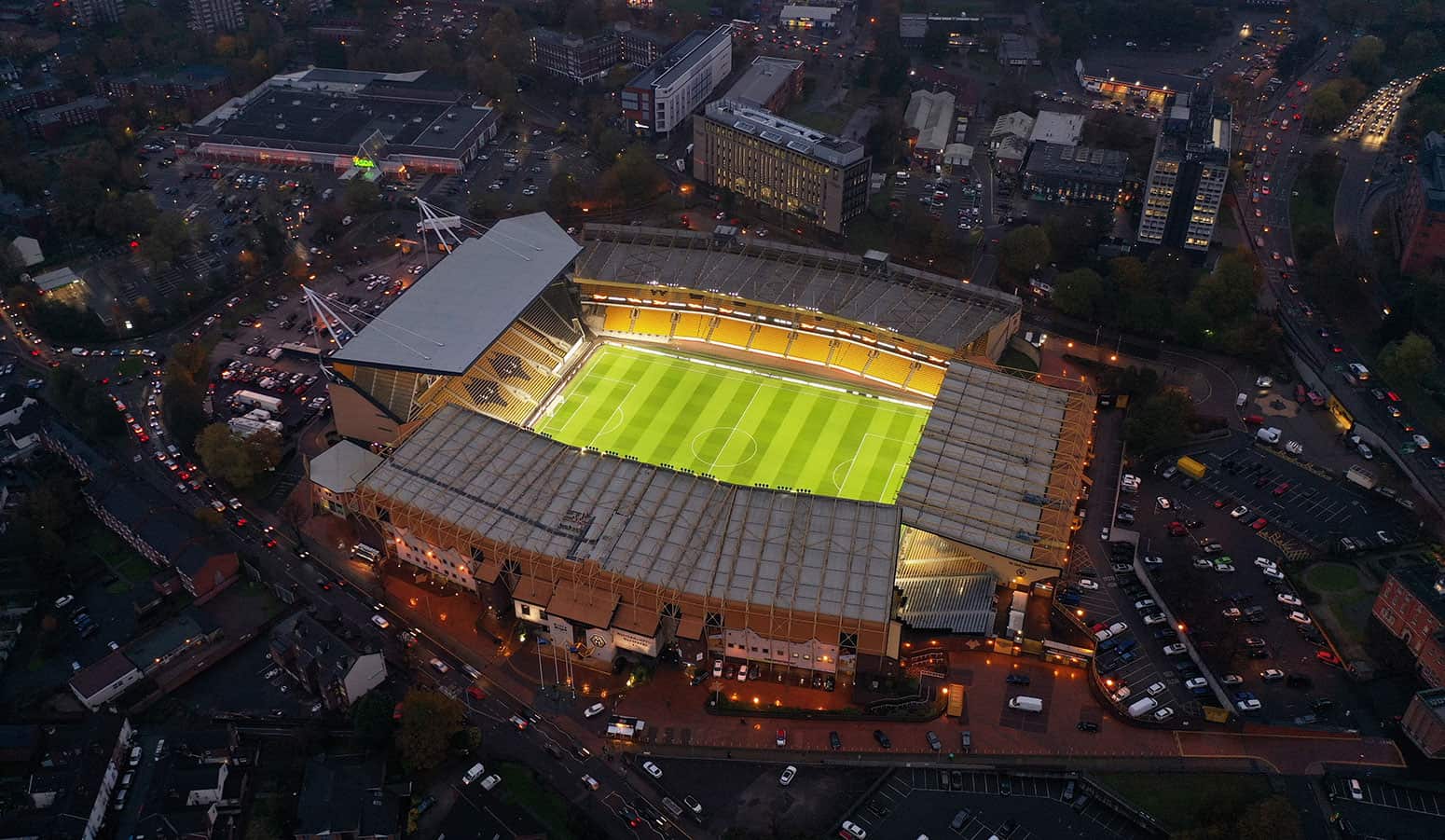Molineux Stadium, located in Wolverhampton, West Midlands, England, has been the proud home of Wolverhampton Wanderers Football Club since 1889. An iconic football ground with a rich history, Molineux holds the distinction of being the first stadium specifically built to host matches in the Football League. It has witnessed countless memorable moments, as the Wolves competed fiercely in both domestic and European competitions over the years.
With a seating capacity of more than 30,000 supporters, Molineux Stadium has hosted numerous passionate fans, creating an electric atmosphere on match days. The ground has undergone significant transformations since its early days, adapting to the evolving needs of modern football. Despite these changes, Molineux remains an integral part of Wolverhampton Wanderers’ identity, and serves as a symbol of the club’s dedication to its loyal fanbase.
Club History
Founding
Wolverhampton Wanderers, also known as Wolves, has a storied past that dates back to 1877. Originally founded as St Luke’s FC, the club gradually became one of the most prominent teams in the West Midlands. Since 1889, their home ground has been the historic Molineux Stadium, located in Wolverhampton, West Midlands, England.
Prominent Years
The club experienced a period of success in the early 1950s, which firmly established its reputation as a football powerhouse. During this time, Wolves won numerous league and FA Cup titles, significantly contributing to the creation of European football.
In the early 1970s, Wolves continued their winning ways by reaching the final of the first-ever UEFA Cup (now known as the Europa League). They achieved this remarkable feat by defeating Juventus on the way. Subsequently, the club managed to win two League Cups in 1974 and 1980.
However, fortunes shifted for Wolves as they endured three consecutive relegations, resulting in a temporary drop to the fourth division of English football.
Recent Achievements
In recent years, Wolverhampton Wanderers have made a strong comeback, earning promotion to the Premier League in the 2018/19 season. Since then, they have consistently maintained a competitive position in the top tier of English football, showcasing their resilience and determination as a historic club. Molineux Stadium continues to be a crucial part of Wolves’ identity, witnessing the highs and lows of their captivating journey.
Molineux Stadium

History
Molineux Stadium, located in Wolverhampton, West Midlands, England, has been the proud home of the Wolverhampton Wanderers Football Club since 1889. In fact, Molineux was the first stadium built specifically for Football League matches. Since its establishment, the stadium has witnessed numerous historical events, with the Wolves enjoying much success in the Premier League and European competitions in recent seasons.
Stadium Layout and Capacity
The stadium has a seating capacity of over 30,000 passionate supporters and offers a splendid matchday experience. Molineux Stadium comprises four distinct stands, namely:
- Billy Wright Stand: Named after the club’s legendary player, this stand is located on the west side of the stadium.
- Sir Jack Hayward Stand: Situated on the east side, this stand pays tribute to the club’s former owner.
- Stan Cullis Stand: Named in honour of the club’s longest-serving manager, the stand is on the north side of the stadium.
- Steve Bull Stand: Located on the south side and dedicated to the club’s all-time leading goal scorer, Steve Bull.
Iconic Features
Molineux Stadium boasts several distinctive characteristics that contribute to its intriguing history and atmosphere. Some of these features include:
- History: Molineux was the first stadium built to host Football League matches in 1889 and has since served as Wolves’ permanent home ground.
- Tours: Fans can enjoy behind-the-scenes access through stadium tours, allowing them to explore the inner workings of this grand arena.
- Matchday Experience: From the electric atmosphere to the state-of-the-art facilities, Molineux Stadium provides an unforgettable matchday experience for every Wolves supporter.
In essence, Molineux Stadium represents a significant part of Wolverhampton Wanderers’ identity and rich history. Visiting this iconic venue is undoubtedly a compelling experience for any football enthusiast.
Legendary Figures
Famous Players
One of the most iconic figures in Wolverhampton Wanderers’ history is Billy Wright. With a statue honouring his memory outside Molineux Stadium, Wright had a long and successful playing career as a defender for the club from 1940 to 1959. He was also the first footballer to earn 100 caps for the England national team. Billy’s contributions to the club are honoured with the aptly named Billy Wright Stand in the stadium.
Another legendary player in Wolves’ history is striker Steve Bull. In his time at the club from 1986 to 1999, Bull became the team’s all-time top scorer, netting 306 goals during his tenure. Steve’s impact on the pitch and dedication to Wolverhampton Wanderers is commemorated with the Steve Bull Stand, which runs parallel to the Billy Wright Stand.
Renowned Coaches
Stan Cullis, a respected former player and captain, took charge of Wolverhampton Wanderers as manager in 1948. Under his guidance, Wolves won the First Division title three times, in 1954, 1958, and 1959, cementing their place as one of the top clubs in England during that era. Molineux Stadium pays tribute to Cullis’ remarkable achievements with the club by naming one of its stands the Stan Cullis Stand.
Jack Harris was another influential figure at Wolves, serving as both a player and a longstanding member of the backroom staff. Although he wasn’t a head coach, Jack’s dedication and commitment to the club throughout his 64 years of service were instrumental in the team’s various successes. In honour of his unwavering loyalty, Molineux Stadium has a stand named the Jack Harris Stand, situated behind one of the goals.
Supporters Culture

Fan Chants
The atmosphere at Molineux Stadium is often lively and filled with passionate supporters who love their team, the Wolverhampton Wanderers. Fan chants play a significant role in the stadium’s vibrant atmosphere, as supporters sing together to express their loyalty to the team and encourage their players. Some popular fan chants include the classic “Wolves Ay We” and “Nuno’s Dream,” which praise the team and its manager.
While the majority of chants aim to rally and support the team, it’s crucial to emphasise a zero-tolerance policy towards discrimination or offensive language in chants. The club was fined £100,000 by the Football Association for homophobic chanting by a section of supporters during a match against Chelsea. Wolverhampton Wanderers continue to work towards fostering an inclusive and respectful environment for all fans.
Rivalries
Rivalries are an integral part of football culture, and the Wolverhampton Wanderers have their share of passionate rivalries with other clubs. One such notable rivalry is with West Bromwich Albion, also known as the “Black Country Derby”. This historical rivalry stems from the clubs’ geographical proximity in the West Midlands, and their matches are always highly anticipated and intense events for both sets of supporters.
Another notable rivalry that the Wolves have is with the Birmingham City FC. Matches between these two teams are also fiercely contested, adding to the excitement of the league season for their supporters.
In conclusion, Molineux Stadium and the Wolverhampton Wanderers supporters bring a friendly atmosphere driven by passion for their team and their local roots. With the combination of unique fan chants and lively rivalries, matchday experiences at Molineux Stadium become truly unforgettable for both home and away fans.
Community Impact
Molineux Stadium has been an integral part of the Wolverhampton community since 1889. As the home ground of the Wolverhampton Wanderers Football Club, the stadium has brought fans from across the region together, fostering a strong sense of camaraderie and local pride.
The presence of the stadium has also had a significant economic impact on the area. On match days, local businesses experience a boost in revenue as fans visit pubs, restaurants, and shops in the vicinity. This helps small and independent businesses in the area to thrive, providing valuable support to the local economy.
In addition to directly benefiting businesses, Molineux Stadium has played a role in boosting Wolverhampton’s reputation as a city of sporting excellence. The stadium’s well-maintained facilities and the football club’s success have attracted attention from visitors and investors alike, contributing to the city’s ongoing development.
Furthermore, the stadium and Wolverhampton Wanderers operate various community outreach programmes that significantly benefit the local population. These initiatives include partnerships with local schools, promoting health and wellbeing, and offering opportunities for young people to develop football skills and socialise with their peers.
In summary, Molineux Stadium has had a positive and lasting impact on the Wolverhampton community. By hosting exciting football matches, contributing to the local economy, and promoting social initiatives, the stadium continues to play a vital role in the area’s identity and development.
International Influence

Molineux Stadium, located in Wolverhampton, West Midlands, England, has been the home ground of Premier League club Wolverhampton Wanderers since 1889. Over the years, the stadium has witnessed a significant international influence, largely due to the diverse players and staff associated with the club.
Wolverhampton Wanderers have consistently attracted talented players from around the globe, adding an international flair to the team. These foreign players have not only showcased their skills on the pitch but have also played a crucial role in fostering a multicultural environment in and around Molineux Stadium. As a result, fans and local residents have been inspired to embrace various cultures and backgrounds.
In recent times, the club’s management has been working towards strengthening its ties with the international football community. This includes forging partnerships with clubs from different countries, participating in pre-season tours and friendly matches overseas, and engaging with fans from various nations.
Furthermore, Molineux Stadium has been proactive in hosting events and exhibitions that celebrate the diverse heritage of its players and fans. For instance, the stadium recently held an event celebrating South Asian Heritage Month, featuring an innovative exhibition curated by football story-teller Dev Trehan in partnership with Sporting Equals. This exhibition, centred around the history and timeline of South Asian heritage female players, aimed to raise awareness and appreciation of the contributions made by these individuals to the world of football.
By promoting diversity and demonstrating a commitment to international engagement, Molineux Stadium stands out as an inclusive, vibrant, and globally connected sports venue.
Future Prospects
Molineux Stadium, the home of Wolverhampton Wanderers, has some exciting developments on the horizon. As part of the Wolverhampton investment prospectus, the club’s owners, Fosun, have outlined plans for a ‘Molineux Quarter’. This area will see comprehensive redevelopment and include new academic buildings, mixed-use development, and an improved public realm, contributing to the overall growth of the club and the city.
The Molineux redevelopment project, estimated at £46 million, has listed some of its key priorities. One of the main goals is to increase the current seating capacity of the stadium, which sits at just under 32,000. With thousands of fans on the season ticket waiting list and home matches often sold out, there is a clear demand for an expansion of the stadium.
Another aspect that the club has to consider while planning an expansion is the careful allocation of funds. With multiple areas and facilities needing improvement, balancing different priorities, and ensuring a sustainable investment plan, becomes essential for the club management.
Talks are still ongoing regarding the Molineux expansion, but with Wolves’ popularity showing no signs of waning, the future of the Molineux Stadium looks set to change for the better. As these plans begin to take shape, Wolves fans can look forward to an improved match-day experience and a club that continues to grow both on and off the pitch.

